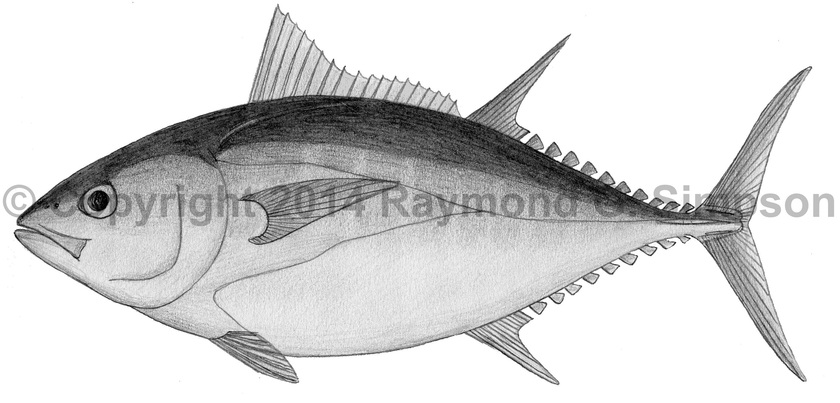
Common Name
Southern Bluefin Tuna
Year Described
Castelnau, 1872
Identification
Dorsal Fin: XIII-XIV, 12-16, followed by 8-10 finlets
Anal Fin: 11-16, followed by 7-9 finlets
Pectoral Fin: 30-36
Gill Rakers: 31-40 (on first arch)
Vertebrae: 39
Body fusiform, robust, and rounded in cross-section. Snout about twice eye diameter. Adipose eyelid absent. Jaw extends to anterior half of orbit. Teeth small and conical. Two interpelvic processes; shorter than pelvic fins. Dorsal fins separated by a very small gap. Spiny dorsal fin long, with a strongly concave margin. Second dorsal and anal fin small with tall anterior lobes. Pectoral fins very short (20-23% of FL). Caudal fin semilunate. Corselet not obvious but present. Body covered in very small scales. Two small caudal keels with a larger median keel in between them. Liver striated.
Color
Body silvery-gray to white with an abruptly dark blue back. A bluish sheen often apparent. Dorsal fins brown to yellowish-brown. Anal fin and both sets of finlets yellowish. Median caudal keel yellow.
Size
Maximum size to 225cm FL. Commonly to 200cm FL.
Habitat
Epipelagic in cold oceanic waters. Forms schools.
Range
Southwestern Atlantic: S. Brazil to Argentina. Also Indian and S. Pacific Ocean.
References
Collette, B.B. and Nauen, C.E. 1983. Scombrids of the world. An annotated and illustrated catalogue of tunas, mackerels, bonitos and related species known to date. FAO species catalogue Vol. 2. , Source: FAO Fish. Synop. Vol. 125. 137pp.